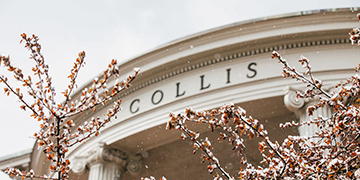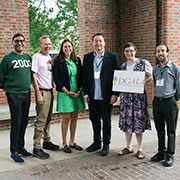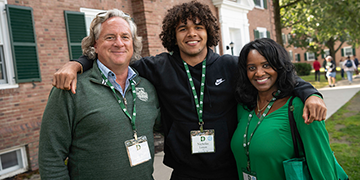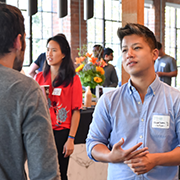Celebrating 40 Years: DGALA Prepares for its Upcoming Milestone Reunion
This event will commemorate four decades of advocacy and the ongoing efforts to support LGBTQIA+ alumni and students.
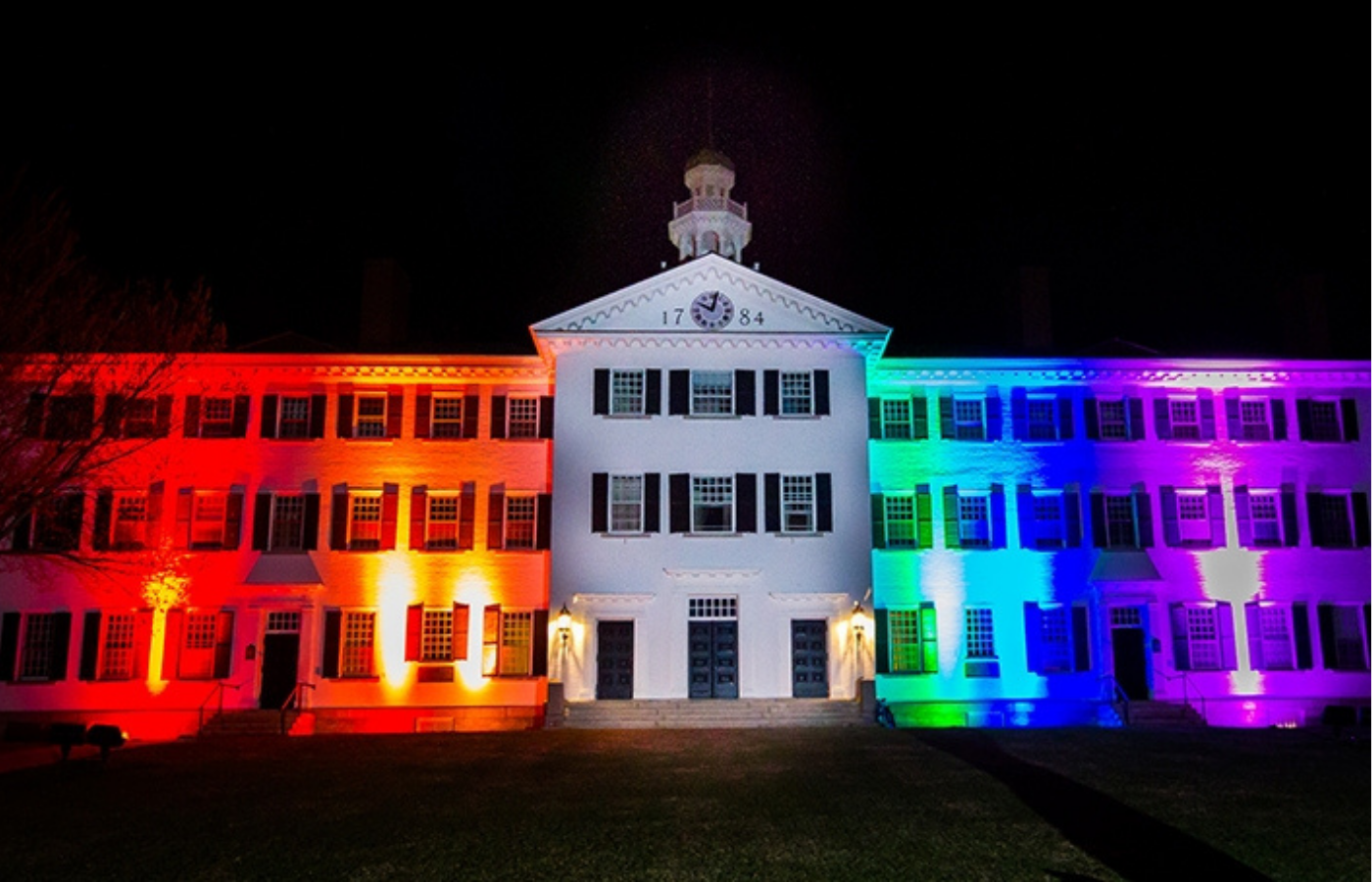
Apr 24, 2025
5 minute read
Courtney Hall
5 minute read
Thousands of Dartmouth alumni and their guests will come together for Reunions 2025, including many members of Dartmouth’s LGBTQIA+ alumni association. The group will convene in Hanover to celebrate its 40th anniversary, marking a significant milestone in its history. This event will not only commemorate four decades of advocacy but also reflect on the ongoing efforts to build community and support for LGBTQIA+ alumni and students at Dartmouth.
A Timeline of DGALA’s History
DGALA’s history dates back to the 1980s, a time when LGBTQIA+ individuals faced significant challenges both nationwide and on college campuses. Dartmouth was no exception. When Dartmouth students first attempted to establish student support groups for LGBTQIA+ students, they were targeted and faced harsh ridicule. In the early ’80s, reporters from The Dartmouth Review published a story about a private meeting of the Gay Students Association (GSA), publishing their private stories shared in confidence.
As students grappled with this harassment, they reached out to LGBTQIA+ alumni for support. In 1975, Ed Hermance ’62 wrote a “Call to Action” letter in the Class Notes section of the Dartmouth Alumni Magazine, identifying himself as a gay man and asking for other alumni to start talking about the existence of gay students and alumni, bringing attention to the topic of LGBTQIA+ rights on campus. For Ed, it was crucial to begin dialogue on the issue to bring it out of the shadows—no matter the current prevailing opinions.
After publishing his Call to Action in the magazine, he began to receive a stream of messages from other LGBTQIA+ individuals interested in connecting. He then began to publish a newsletter on LGBTQIA+ topics for students and alumni called Dartmouth Lambda. However, attempts to form an official alumni group met resistance. The administration, citing a desire to distance itself from identity-based organizations, refused to recognize a group focused on LGBTQIA+ alumni.
Instead, a group began to organize on their own. The early version of DGALA was initially established in Philadelphia under Ed Hermance’s leadership, but New York City soon became the center of its activities because of its larger base of LGBTQIA+ alumni.
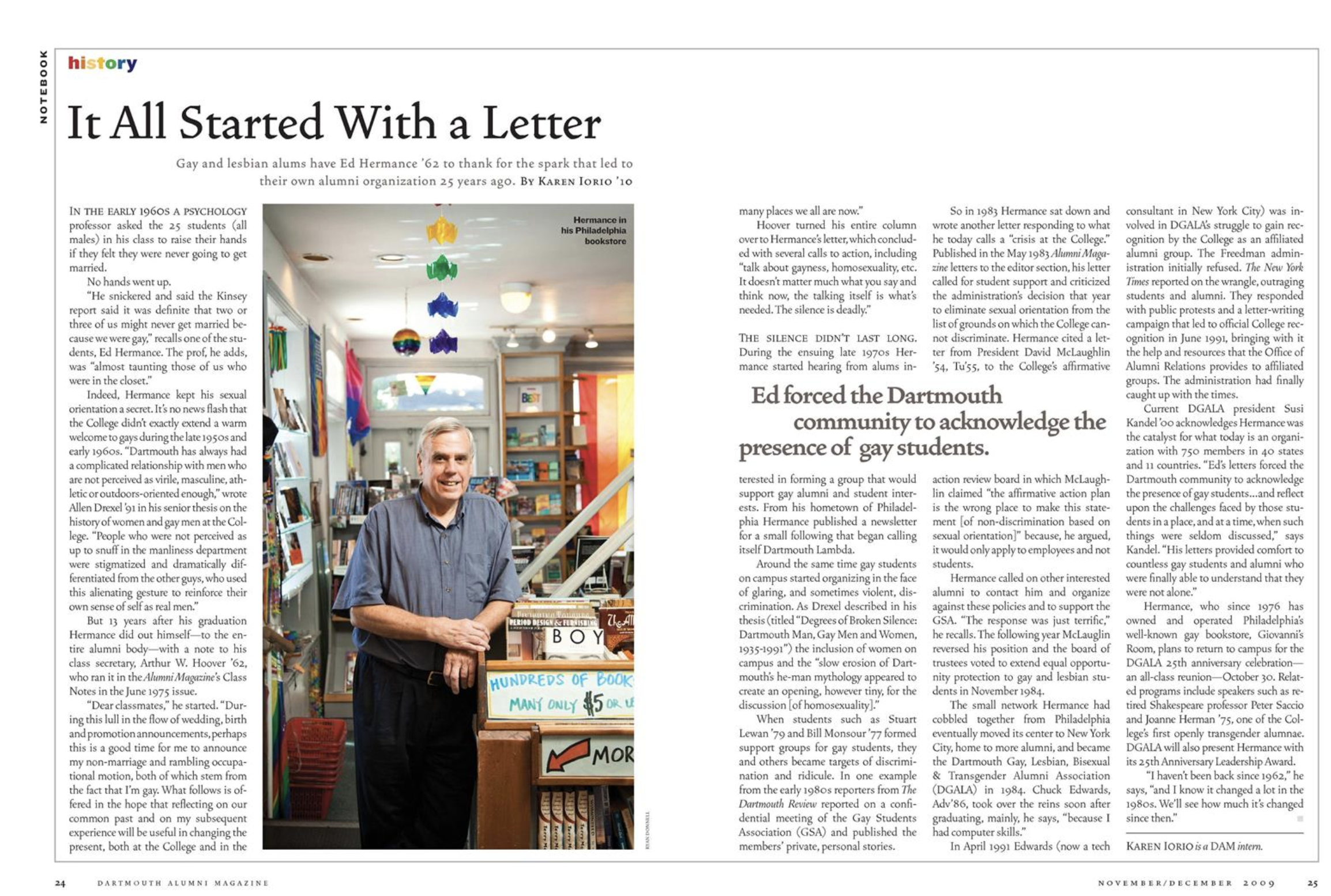
Charles “Chuck” Edwards GR’86 played a crucial role in organizing efforts there, even drawing the attention of The New York Times in a piece on Dartmouth’s refusal to support the group.
Pete Williams ’76, a current DGALA board member and its secretary, became involved in the late 1980s, before the group gained official recognition. At the time, Pete described himself as a marginal member, participating in events like marching with other Dartmouth alumni in the New York City Pride Parade.
By the early 1990s, however, DGALA’s progress had stalled. In 1993, long-time Dartmouth volunteer Richard “Dick” Leonard ’50 reached out to Pete with an urgent plea: “Pete, DGALA is dying. You have to do something.” With support and mentorship from Dick and Chuck Edwards, Pete organized a pivotal meeting in 1994 at the Dartmouth Club in New York City. The meeting coincided with the 25th anniversary of Stonewall, drawing many LGBTQIA+ community members to the city. Around 25 alumni gathered to reinvigorate DGALA, choosing a collective structure over appointing a president in its early stages. Pete played a vital role in formally incorporating DGALA as a nonprofit in New York, using resources from his law firm to help make it happen. Despite Pete’s modest description of himself as “just the secretary,” his dedication—especially in managing the group’s biannual newsletter—has been essential to DGALA’s longevity.
Although it was limited, official recognition from Dartmouth’s Office of Alumni Affairs finally came in the early 1990s. DGALA was restricted from seeking funding from the College, but the recognition itself was a step toward the rightful place of LGBTQIA+ individuals within the Dartmouth community.
DGALA’s Key Achievements and Contributions
Throughout its history, DGALA has focused on supporting LGBTQIA+ students and advocating for their rights and sense of belonging at Dartmouth. Among its most significant achievements was the funding and establishment of Triangle House, a social and residential space created specifically for LGBTQIA+ students. After years of effort, including substantial DGALA fundraising that garnered $500,000 for its construction, Triangle House has become a cornerstone of support for LGBTQIA+ students on campus.
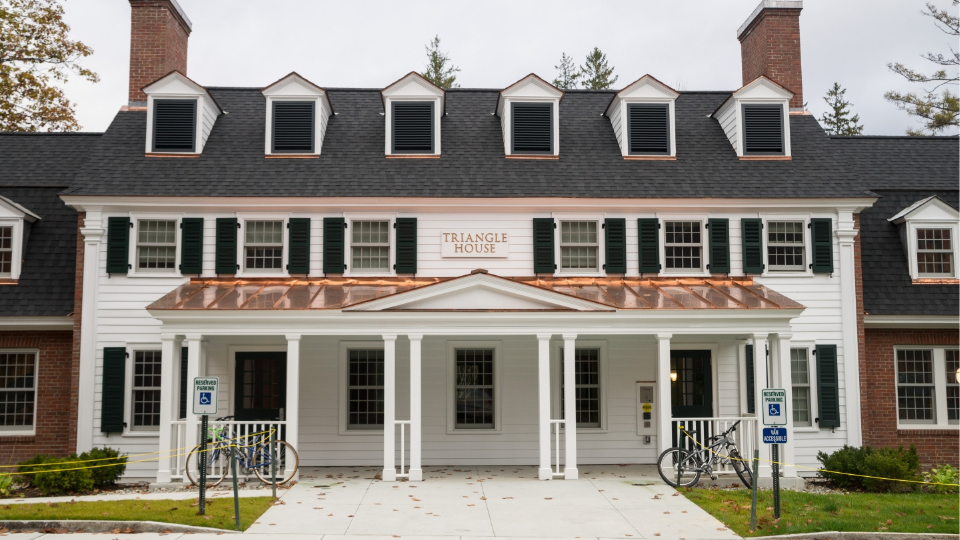
In addition to Triangle House, DGALA introduced Triangle Grants, which provide financial support for programming aimed at enriching the experiences of LGBTQIA+ students. This initiative facilitates events that promote inclusion, dialogue, and community engagement, making Triangle House a hub for student activity and connection.
Another important achievement came in 2017 with the launch of the SpeakOut project. Inspired by the concept of the popular program StoryCorps, the project set out to collect oral histories from LGBTQIA+ alumni, allowing them to share and memorialize their experiences. Through a partnership with the Dartmouth Library spearheaded by digital collections and oral history archivist Caitlin Birch, Dartmouth students were trained to interview alumni about their experiences. This intergenerational project captured these sometimes-difficult narratives and emphasized DGALA’s commitment to preserving the often-fraught history of LGBTQIA+ experiences at Dartmouth.
An Intergenerational Community: DGALA’s Relationship with Current Students
One of DGALA’s priorities has been fostering a strong connection between current students and alumni. Regular engagement includes events like “Lavender Graduation,” where LGBTQIA+ students can celebrate together, as well as other initiatives and gatherings that recognize their achievements and provide a platform for their voices to be heard. Free t-shirts and participation incentives encourage students to connect with DGALA, helping to strengthen the sense of community.
This partnership has created an environment where students feel supported both socially and academically. Annual events and initiatives aimed at fostering inclusivity allow current students to celebrate their identities, feel a sense of belonging on campus, and connect with alumni who have paved the way for progress.
The 40th Anniversary Event
As DGALA approaches its 40th anniversary, the upcoming celebration is both a reflection of the past and a vision for the future. Planned activities include a performance by the student-run drag club House of Lewan, an ice cream social at Triangle House, a visit to the special exhibit at Rauner Special Collections called “Queer Then and Now,” and a panel discussion featuring Dr. Estevan Garcia, chief health and wellness officer. The weekend will also include a memorial tribute to Leon Black Professor Emeritus of Shakespearean Studies and Professor of English Peter Saccio, a longtime English professor and renowned Shakespeare scholar at Dartmouth who passed in 2024. For many years Professor Saccio served as a student advisor for LGBTQIA+ students on campus, and his impact on the community remains significant.
The reunion promises to be a gathering where alumni can reconnect and share experiences while also contemplating the challenges that lie ahead. To learn more and register for DGALA’s 40th Reunion, visit the Reunions 2025 page.


